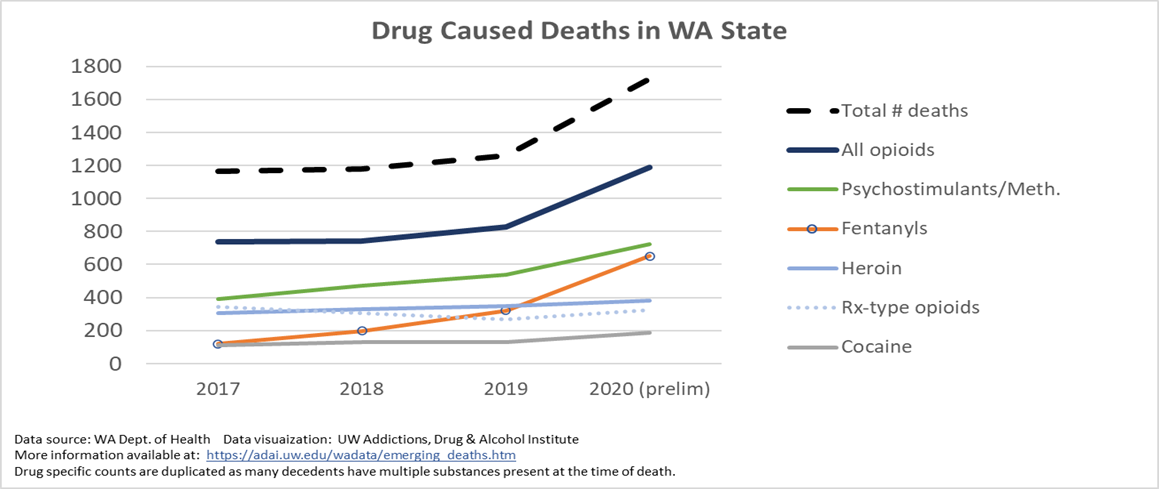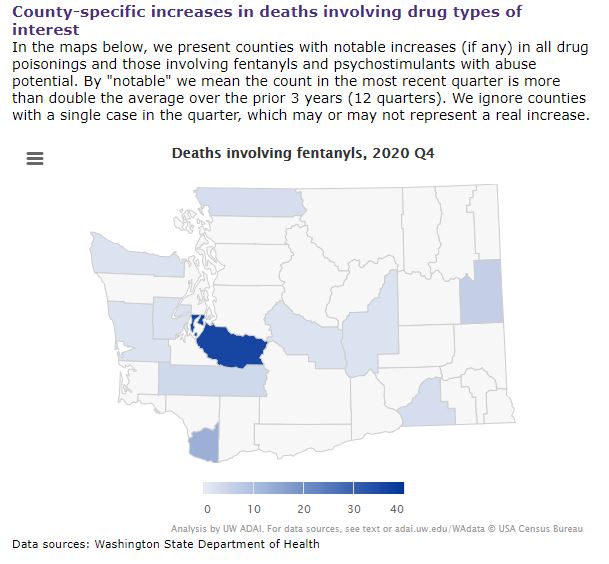Overdose Deaths in WA Increase 37% in 2020
07/16/2021Overdose deaths increased 37% in WA in 2020, with 1,724 deaths in 2020 compared to 1,259 in 2019. The largest contributor is a dramatic increase in deaths from fentanyl and fentanyl-related drugs that are illicitly manufactured.
ADAI’s WA State Opioid/Major Drug Interactive Data: Preliminary drug death trends in Washington state page has updated data from the Department of Health, including preliminary overdose death data through the end of 2020. For questions about these data please contact ADAI Research Scientist Jason Williams.
- Fentanyl-involved deaths doubled, with 652 deaths in 2020 compared with 321 deaths in 2019. Fentanyl has contributed to a greater share of drug deaths, ~10% in 2017 to ~40% in 2020.
- Deaths involving psychostimulants, primarily methamphetamine, increased 34%, from 540 in 2019 to 725 in 2020.
- Heroin and prescription-type opioid deaths were relatively flat.

Notable increases in fentanyl deaths in the fourth quarter were seen in 11 counties. This was the second successive such quarter for Pierce, Clark, and Spokane counties. (Map below from the Preliminary drug death trends in WA State page.)

Notable increases in deaths involving psychostimulants/methamphetamine were seen in Mason (n=4), Walla Walla (n=2), and Whatcom (n=4) counties.
Learn more about fentanyl
- Fentanyl webpage from StopOverdose.org
- Laced & Lethal: campaign to educate youth and young adults about risks from fentanyl in King County, from Rescue Agency and King County
- Fentanyl and overdose resources from Public Health-Seattle & King County
See also slides from ADAI’s recent Transforming our Communities session on youth fentanyl use. The slides include:
- A description of Ryther’s approach to working with youth who use fentanyl, by Johnny Ohta and Dr. Taryn Hansen
- Fentanyl and overdose death data from Dr. Caleb Banta-Green, ADAI
- Overview of the Laced & Lethal campaign from Alison Newman, ADAI
Learn more about how to identify and reverse an opioid overdose at StopOverdose.org. For information about life-saving treatment medications for opioid use disorder, as well as other recovery supports, visit LearnAboutTreatment.org.





